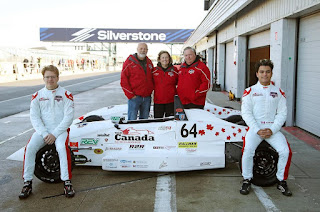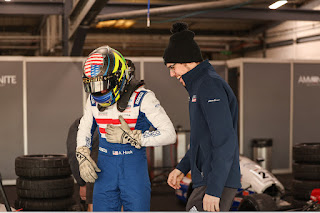Racing for Equality - a discussion on women in motorsport | featuring Charlotte Birch
Historically, motorsport has been known as a ‘boy’s club’ - characterised as a male-dominated environment, exclusive to displays of masculinity and exclusionary to any female involvement. Whilst progress has undoubtedly been made, spearheaded by key figures such as Susie Wolff, Michele Mouton and Jessica Hawkins, this mentality still promulgates, with motorsport still being perceived today as a sport by men, for men. It is genuinely no wonder that women are deterred from the sport. Even if we overlook the discouraging factor that is the male-centred historic background of the sport, countless women today have spoken about their experiences being mistreated in the industry - if all young women and girls see are the negative experiences of other women in motorsport, in what world would they be motivated to put themselves through that same negativity?
This is in no way to claim that women shouldn’t discuss their mistreatment, quite the opposite - if more and more women make their experiences known, there will undeniably be more of a push toward change. What does need to change however is the experiences of these women. The reality should not be that women are made to feel insecure, overly scrutinised and subject to backlash and mistreatment simply due to their identities. In my view, yes there absolutely needs to be a push for more women to get into motorsport, however, even arguably before this, the working conditions for women in the industry needs to be addressed. Women joining the sport will not want to remain in their positions if they’re subject to the sexist treatment that undeniably takes place, whether this be outright, underlying or systemic.
With this topic in mind, whilst shadowing at the Britcar Endurance Championships in October, I had the opportunity to speak with Charlotte Birch, a driver in the Trophy Championship. In-between races I was able to sit down with her and discuss her personal experiences as a woman in the motorsport industry, as well as her thoughts on what can be done to ensure the progression of female presence and representation in what has historically been such a male-dominated industry. Charlotte began her motorsport career 7 years ago, being introduced to the field initially by her father. She began through the Brands Hatch Young Driver Experience, progressing through Junior Championships, and has raced most recently in Ginetta, Britcar and the GT Cup.
Charlotte discussed how, whilst moving throughout the motorsport industry, the presence of other girls has always been very limited. Beginning with her experiences through junior championships, where there were “at maximum, two other girls”, up to Britcar, where she has consistently been the only female driver, through to GT Cup, where she was actually paired with the other woman on the grid (which was a notably positive experience for Charlotte), she has always been isolated as one of the few women present at all. This experience, being one of the only female racers in such a male-dominated environment, has been one of mixed emotions, with junior championships in particular proving to be a difficult experience.
Hearing Charlotte’s experiences, it is clear that especially in junior series, where prejudice can typically promulgate due to less policing and regulation of treatment and language than in more established senior series, there is a desperate need to establish more respect for the women in the sport. She discussed her experiences, consistently being given a harder time, noticing the difference in treatment between herself and her male counterparts even as a young girl. This continued struggle for girls in junior series has been one continuously discussed by others, with another key talking point being investment. It is a proven fact that garnering investment and funding for female racers is a far more arduous task for teams as opposed to doing the same for male drivers - a topic discussed in detail by a recent BBC article by Andrew Benson. Negative stereotypes surrounding the ability of all female drivers has led to a drastic difference between male and female investment, even if drivers are competing to the exact same standards - which is yet another deterrent for young girls trying to break into the already economically challenging sport.
Despite the continued lack of female involvement, her experiences in senior racing have been a definite improvement to that of junior championships. Charlotte commented that in series such as Britcar and GT Cup, there are signs of progression, with the mentality that “as long as you perform on track, that’s all that matters” being one commonly held. Therefore, there is some level of hope for continued future progression - the issue is, we need young girls to persevere through difficult treatment at the beginning of their careers to even reach this point.
The fact that it was at a junior level where Charlotte, and seemingly numerous other girls, have suffered most is especially heartbreaking here. In an environment where young drivers should be encouraged and nurtured in preparation for their future endeavours, being treated the way she, alongside so many other girls, have been instead sets the precedent that this field is not one where she belongs, when in reality this is not at all true. This treatment of young girls in motorsport needs to be a focus moving forward. If we are genuinely striving for more female involvement, these girls need to be encouraged to pursue a future in motorsport to begin with - and if they are consistently made to feel ostracised, this future will obviously never become a reality.
We discussed ideas of what Charlotte, as someone heavily involved in the field, would like to see implemented to encourage greater female representation in motorsport. She began by explaining that “the biggest incentive for girls would obviously be to see female drivers in Formula One”, which as a series with so much attention and influence, would undeniably have a massive impact on the perception of women and girls involved within the sport. However, as put by Charlotte, “we’re a way off that at the moment”. This can be attributed in part to the aforementioned, historic ‘boy’s club’ mentality of racing series and the foundations of motorsport as a male environment. It will undoubtedly take some time for female involvement to progress to that of F1, so this idea definitely looks like one for the future - although it is one that is becoming less unattainable recently, especially with the emergence of F1 Academy and popular top-level racers such as Sophia Floersch in F3, and Bianca Bustamante in F4 (who as of the date of publication, has become a development driver for McLaren!) giving young women and girls an insight into the possibility of top level involvement in the sport.
We also talked about the need to see more women in motorsport in general - for young women and girls, even just seeing girls like themselves involved in the field can be affirmation enough that they are just as deserving of a place in the sport. Seeing women, not only as drivers, but as mechanics, engineers, reporters and more can break the mentality that the sport is one for men and men only, and instead establish that this is an environment where women and achieve and thrive. It is for this reason that initiatives such as ‘Girls on Track UK’ and ‘Females in Motorsport’ are so important - giving a platform to, and shining a light on women who are achieving in the field is so vital to demonstrate to others that they too are capable of achievement.
In essence, whilst the progression of female involvement in motorsport is undoubtedly improving, this improvement is far from enough to be considered equal. In my own opinion, there needs to be a specific focus on two key areas: the treatment of young girls when first beginning their motorsport journeys, and the treatment of women already in the field. If young girls feel genuinely welcomed in motorsport, can express their passion and competitive drive without being put down, and are encouraged to succeed, then racing as an entire field will begin to feel more attainable for so many young girls, therefore naturally increasing the proposition of female representation. On top of this, if women already working in motorsport are treated with equal respect to men, it is far more likely that they will remain in the field, as well as potentially encouraging others to peruse the same path.
If we genuinely want more women in motorsport - we have to make the sport somewhere that women are excited to be. We have to create an equal, encouraging environment for women and girls to thrive, and it is then that I believe we will begin to see improvements in the proportion of female representation in motorsport.


Comments
Post a Comment